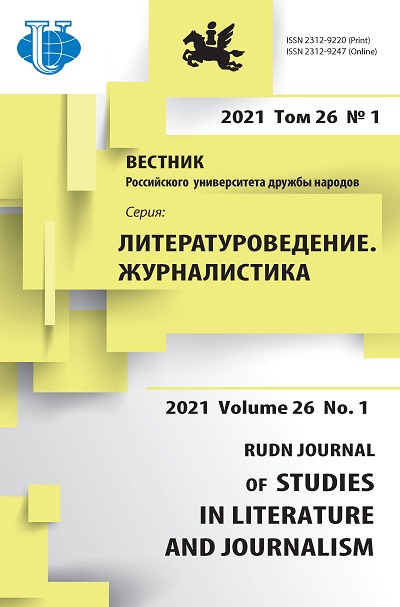Buffoonery in the Speech of the Character and the Issue of Historical Form in the Novel The Winter of Our Discontent by J. Steinbeck
- Authors: Sinegubova K.V.1, Aksenova A.A.1
-
Affiliations:
- Kemerovo State University
- Issue: Vol 26, No 1 (2021)
- Pages: 60-70
- Section: LITERARY CRITICISM
- URL: https://journals.rudn.ru/literary-criticism/article/view/26077
- DOI: https://doi.org/10.22363/2312-9220-2021-26-1-60-70
- ID: 26077
Cite item
Full Text
Abstract
The intention is to explain some aspects of hybridization of language consciousness in this literary work. The aim of the study is to clarify the issue of a word in the novel, which was updated by M.M. Bakhtin. The general thesis is that the tendency to hybridization explains the juxtaposition of serious and funny within the character’s utterance: the border between prosaic reality and the character’s own world is found precisely when he turns to jokes. The speech of the character indicates a tendency to aestheticize the household environment. This trend leads to a high-intensity hybridization of everyday words and Holy Scripture . The novel The Winter of Our Discontent is more than a didactic literary work and reveals some features of the picaresque novel, but the necessary feature of the picaresque novel is the first-person narrative. Instead of this form of narration the character and the narrator’s points of view are brought closer together in the novel by J. Steinbeck. The literary work with the features of the picaresque novel remains multidimensional and does not reduce only to one of the existing novel forms, and typologically is rather anti-picaresque. The character’s buffoonery gives him the right to detachment, due to which the skewed nature of other characters in the novel is overcome. The language hybridization in this work plays a key role in understanding of the novel.
Keywords
About the authors
Kapitalina V. Sinegubova
Kemerovo State University
Author for correspondence.
Email: sinegubova@nextmail.ru
Candidate of Philology, Associate Professor at the Department of Journalism and Russian Literature of the XX century
6 Krasnaya St., Kemerovo, 650000, Russian FederationAnastasia A. Aksenova
Kemerovo State University
Email: AA9515890227@yandex.ru
Master of Philosophy, lecturer and researcher in the field of linguistics and literary studies (programme of study “Theory of literature. Textology”), lecturer of the Department of Journalism and Russian Literature of the XX Century
6 Krasnaya St., Kemerovo, 650000, Russian FederationReferences
- Zhdanova, L.I. (2016). “Zima trevogi nashei” Dzhona Steinbeka v SSSR [“The Winter of Our Discontent” by John Steinbeck in the USSR]. Proceedings of the Southern Federal University. Philological Sciences, (1), 20–27. doi: 10.18522/1995-0640-2016-1-20-27. (In Russ.)
- Levidova, I.M. (1962). Poslevoennye knigi Dzhona Steinbeka [Postwar books by John Steinbeck]. Voprosy literatury [Questions of literature], (8), 122–142. (In Russ.)
- Orlova, R.I. (1962). Den'gi protiv chelovechnosti [Money against humanity]. Literaturnaia Ucheba [Literary Studies], (3), 197–208. (In Russ.)
- Kozubenko, L.M. (2016). Kontseptsіia dobra і zla v romanі Dzhona Steinbeka “Zima turboti nashoї”. Filologia, Literatura, Socjologia i Kulturoznawstwo. Aktualne Naukowe Problemy. Rozpatrzenie, Decyzja, Praktyka (pp. 9–13). Warsaw, Diamand Trejding tur. (In Ukr.)
- Osmukhina, O.Iu. (2018). Problema cheloveka v romanakh Dzh. Steinbeka “Grozd'ia gneva” i “Zima trevogi nashei” [The problem of man in the novels of J. Steinbeck's “Grapes of Wrath” and “The Winter of Our Discontent”]. Filologicheskie Nauki. Voprosy Teorii i Praktiki [Philological Sciences. Questions of Theory and Practice], 3(81)(part 1), 45–49. (In Russ.)
- Post, C. (1993) History's myth: John Steinbeck and the twilight of western culture (Ph.D. Dissertation). Lubbock, Texas Tech University.
- Railsback, B.E. (2007). The moral philosophy of John Steinbeck: Review. Steinbeck Review, 3(1). DOI: 10.135а3/str.2007.0016.
- Bakhtin, M.M. (1975). Voprosy literatury i estetiki. Issledovaniia raznykh let [Questions of literature and aesthetics. Studies of different years]. Moscow, Khudozhestvennaya literatura Publ. (In Russ.)
- Stow, S. (2013). “Can you honestly love a dishonest thing?” The tragic patriotism of “The Winter of Our Discontent”. In C.E. Zirakzadeh and S. Stow, A Political Companion to John Steinbeck. University Press of Kentucky.
- Bakhtin, M.M. (2019). Sobranie sochinenii. T. 3. Teoriya romana (1930–1961 gg.) [Collected works. Vol. 3. The theory of the novel (1930–1961)]. Moscow, Kniga po Trebovaniiu Publ. (In Russ.)
- Tamarchenko, N.D. (1979). K metodologii issledovaniia russkogo klassicheskogo romana (priroda i tipy khudozhestvennogo tselogo) [On the methodology of research of the Russian classical novel (nature and types of artistic whole)]. Literaturnoe Proizvedenie kak Tseloe i Problemy Ego Analiza: Mezhvuzovskii Sbornik Nauchnykh Trudov [Literary Work as a Whole and Problems of Its Analysis: Interuniversity Collection of Scientific Papers]. Kemerovo. (In Russ.)
- Tiupa, V.I. (1987). Poetika alliuzii v romane Dzh. Steinbeka “Zima trevogi nashei” [Poetics of allusions in the novel by J. Steinbeck's “The Winter of Our Discontent”]. Problemy Istoricheskoi Poetiki v Analize Literaturnogo Proizvedeniia [Problems of Historical Poetics in the Analysis of a Literary Work]. Kemerovo. (In Russ.)
- Fukson, L.Iu. (2016). Smekh kak sposob istolkovaniia [Laughter as a way to interpretation]. Kemerovo, Kuzbassvuzizdat Publ. (In Russ.)
- Dvoriashina, V.S. (2018). Simvolika prostranstvennykh obrazov v romane Dzhona Steinbeka “Zima trevogi nashei” [Symbolism of spatial images in John Steinbeck's novel “The Winter of Our Discontent”]. Inostrannye Iazyki v Uzbekistane [Foreign Languages in Uzbekistan], 4(23), 279–285. (In Russ.)
- Steinbek, Dz. (2018). Zima trevogi nashei. Puteshestvie s Charli v poiskakh Ameriki [The Winter of Our Discontent. Traveling with Charlie in search of America]. Moscow, AST Publ. (In Russ.)
Supplementary files















